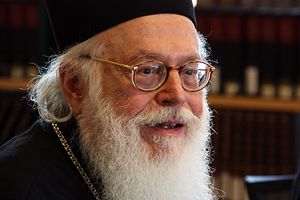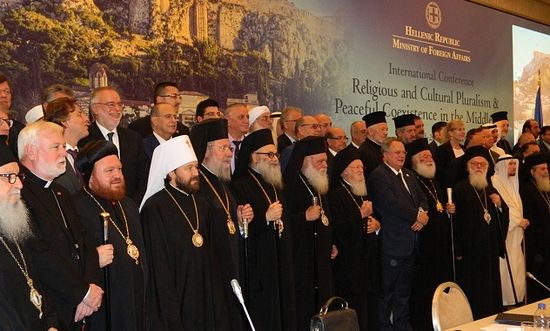His Beatitude Patriarch Theophilos of Jerusalem, His Eminence Anastasios of Tirana, Metropolitan Hilarion (Alfeyev)
The largest ever conference dedicated to the plight of
Christians and other religious minorities in the Middle
East was held in Athens October 19-20, 2015, entitled
"Religious and Cultural Pluralism and Peaceful
Co-existence in the Middle East." Delegates from
fifty countries gathered, including primates of local
Orthodox Churches, representatives of Catholic and
Protestant communities, Muslim leaders, governmental
officials, and representatives of international
organizations and the academic community.
Among the participants were His Holiness Patriarch Bartholomew of Constantinople, their Beatitudes Patriarchs Theodoros of Alexandria and All Africa, John of Antioch and All the East, Theophilos of Jerusalem and All Palestine, and their Beatitudes Archbishops Chrysostom of New Justiniana and All Cyprus, Jeronymos of Athens and All Greece, and Anastasios of Tirana and All Albania. The Russian Orthodox Church was represented by Metropolitan Hilarion of Volokolamsk, head of the Moscow Patriarchate department for external church relations (DECR).
Below are the addresses to the conference of three Orthodox hierarchs:
Source: Jersualem Patriarchate
 The conscious acceptance of
religious and cultural pluralism and the peaceful
coexistence of various communities can come from two
opposite starting points: either from indifference to
religious faith or the conscious experience of
religious substance. Conversely, religious
intolerance between coexisting religious communities
and cultural traditions can be developed by: a)
religious-origins, e.g. from an extreme fanaticism,
or b) non-religious roots, e.g. political factors, or
nationalism, which use religion for other pursuits.
All these influences remain strong in the Middle
East.
However, the human desire for world peace remains
apprehensive. Thus, every effort to study and confront the
complexity of this problem is a valuable contribution.
Therefore wholehearted congratulations are merited to the
Greek Ministry of Foreign Affairs of the Hellenic
Republic, to its Head, His Excellency the Foreign Minister
Professor Nikolaos Kotzias, and his distinguished
colleagues, for taking the initiative to organize this
International Conference. With great pleasure we welcome
the opening of its proceedings and we wish for fruitful
success.
The conscious acceptance of
religious and cultural pluralism and the peaceful
coexistence of various communities can come from two
opposite starting points: either from indifference to
religious faith or the conscious experience of
religious substance. Conversely, religious
intolerance between coexisting religious communities
and cultural traditions can be developed by: a)
religious-origins, e.g. from an extreme fanaticism,
or b) non-religious roots, e.g. political factors, or
nationalism, which use religion for other pursuits.
All these influences remain strong in the Middle
East.
However, the human desire for world peace remains
apprehensive. Thus, every effort to study and confront the
complexity of this problem is a valuable contribution.
Therefore wholehearted congratulations are merited to the
Greek Ministry of Foreign Affairs of the Hellenic
Republic, to its Head, His Excellency the Foreign Minister
Professor Nikolaos Kotzias, and his distinguished
colleagues, for taking the initiative to organize this
International Conference. With great pleasure we welcome
the opening of its proceedings and we wish for fruitful
success.
1. It is my personal belief that the cultivation of a healthy religious conscience constitutes the stable foundation for peaceful coexistence, and not religious indifference. In the monotheistic religions that dominate the Middle East the following are found: a) a search for inner peace b) the curbing of aggression, c) principles that facilitate peaceful co-existence within each particular social group, d) peaceful relations with the supreme Reality, with a Personal God, e) the desire to maintain peace with all humankind. Christians particularly perceive God as a God of peace and request his intervention.
All of us who have a responsibility within the religious communities in our region must cultivate a peaceful theology and anthropology, drawing on the richness of our religious principles and the best pages of our traditions. Particularly we are called to condemn all forms of violence. Stressing the duty of every person to respect the religious freedom of our fellow human beings. Violence in the name of religion defiles the essence of religion. And every crime in the name of religion is a crime against religion itself. No one has the right to use the oil of religion, to strengthen the fire of armed conflict. Religion is a divine gift, which calms hearts, heals wounds and brings individuals and peoples closer together.
2. Peace is directly related to justice. An unjust world cannot be peaceful. A clear rule, which is already highlighted in the Old Testament, is that: “To do righteousness and justice is more acceptable to the Lord than sacrifice” (Prov. 21.3). In our century, peace and justice have adopted another synonym: development. Poverty remains the worst type of violence. When people are deprived of their basic needs for survival, it is not strange for them to turn to other directions and adopt extreme religious beliefs to achieve a just society.
Obviously, there exists a general responsibility of the great powers for the crises in the Middle East: promoting decisions for violent changes of leadership and regimes; the supplying of weapons; apathy to collateral damage; and the millions of innocent victims and huge waves of refugees; pollution of the environment and destruction of rare monuments of culture.
It is time for everyone to shake off their lethargy and take effective action in order to cease the military conflicts and terrible bloodshed.
The efforts for peace and security need to combine forces to care about social justice and to develop the world’s poorest communities. It would be a tragic political error if, due to negligence or arrogance, these powers were to allow it to develop into a new multiform proletariat, able to abuse the spiritual “atomic energy” of a concrete religious tradition.
3. Finally the opposite of peace is not exactly war, but egotism: individual, collective, national, and racial. It enlists the various forms of violence, which in numerous ways kills peaceful coexistence. It initiates and fuels large and smaller conflicts and it constantly renews hate.
The antidote to egocentrism is not generic advice or various laws and state suppression mechanisms, but rather the strengthening of love in society. A multidimensional effective love that is not limited by borders, prejudice, or discrimination of any kind. Here there is also enormous potential for the contribution of a healthy religious conscience. This, even under conditions of long-standing conflicts, grants the power of forgiveness and reconciliation.
The power of love, after all, is one that can defeat the love of power, which constantly destroys peace. The inexhaustible source of love remains the truth, which in the most simple and shocking way the evangelist John expressed: “God is love, and he who abides in love abides in God, and God in him” (1 Jn. 4:16).
I wish wholeheartedly, through the presentations, discussions and general deliberation of our Conference, that we might draw valuable material for a fuller, deeper understanding of our theme and that we might be able to continue more enthusiastically to be peace workers. The unceasing struggle for peace, justice and solidarity is the most essential and valuable contribution that we can offer for the survival and the cultural development of the Middle East.
Among the participants were His Holiness Patriarch Bartholomew of Constantinople, their Beatitudes Patriarchs Theodoros of Alexandria and All Africa, John of Antioch and All the East, Theophilos of Jerusalem and All Palestine, and their Beatitudes Archbishops Chrysostom of New Justiniana and All Cyprus, Jeronymos of Athens and All Greece, and Anastasios of Tirana and All Albania. The Russian Orthodox Church was represented by Metropolitan Hilarion of Volokolamsk, head of the Moscow Patriarchate department for external church relations (DECR).
Below are the addresses to the conference of three Orthodox hierarchs:
* * *
* * *
Address of His Eminence Anastasios,
Archbishop of Tirana, Durres and All
Albania

1. It is my personal belief that the cultivation of a healthy religious conscience constitutes the stable foundation for peaceful coexistence, and not religious indifference. In the monotheistic religions that dominate the Middle East the following are found: a) a search for inner peace b) the curbing of aggression, c) principles that facilitate peaceful co-existence within each particular social group, d) peaceful relations with the supreme Reality, with a Personal God, e) the desire to maintain peace with all humankind. Christians particularly perceive God as a God of peace and request his intervention.
All of us who have a responsibility within the religious communities in our region must cultivate a peaceful theology and anthropology, drawing on the richness of our religious principles and the best pages of our traditions. Particularly we are called to condemn all forms of violence. Stressing the duty of every person to respect the religious freedom of our fellow human beings. Violence in the name of religion defiles the essence of religion. And every crime in the name of religion is a crime against religion itself. No one has the right to use the oil of religion, to strengthen the fire of armed conflict. Religion is a divine gift, which calms hearts, heals wounds and brings individuals and peoples closer together.
2. Peace is directly related to justice. An unjust world cannot be peaceful. A clear rule, which is already highlighted in the Old Testament, is that: “To do righteousness and justice is more acceptable to the Lord than sacrifice” (Prov. 21.3). In our century, peace and justice have adopted another synonym: development. Poverty remains the worst type of violence. When people are deprived of their basic needs for survival, it is not strange for them to turn to other directions and adopt extreme religious beliefs to achieve a just society.
Obviously, there exists a general responsibility of the great powers for the crises in the Middle East: promoting decisions for violent changes of leadership and regimes; the supplying of weapons; apathy to collateral damage; and the millions of innocent victims and huge waves of refugees; pollution of the environment and destruction of rare monuments of culture.
It is time for everyone to shake off their lethargy and take effective action in order to cease the military conflicts and terrible bloodshed.
The efforts for peace and security need to combine forces to care about social justice and to develop the world’s poorest communities. It would be a tragic political error if, due to negligence or arrogance, these powers were to allow it to develop into a new multiform proletariat, able to abuse the spiritual “atomic energy” of a concrete religious tradition.
3. Finally the opposite of peace is not exactly war, but egotism: individual, collective, national, and racial. It enlists the various forms of violence, which in numerous ways kills peaceful coexistence. It initiates and fuels large and smaller conflicts and it constantly renews hate.
The antidote to egocentrism is not generic advice or various laws and state suppression mechanisms, but rather the strengthening of love in society. A multidimensional effective love that is not limited by borders, prejudice, or discrimination of any kind. Here there is also enormous potential for the contribution of a healthy religious conscience. This, even under conditions of long-standing conflicts, grants the power of forgiveness and reconciliation.
The power of love, after all, is one that can defeat the love of power, which constantly destroys peace. The inexhaustible source of love remains the truth, which in the most simple and shocking way the evangelist John expressed: “God is love, and he who abides in love abides in God, and God in him” (1 Jn. 4:16).
I wish wholeheartedly, through the presentations, discussions and general deliberation of our Conference, that we might draw valuable material for a fuller, deeper understanding of our theme and that we might be able to continue more enthusiastically to be peace workers. The unceasing struggle for peace, justice and solidarity is the most essential and valuable contribution that we can offer for the survival and the cultural development of the Middle East.

No comments:
Post a Comment